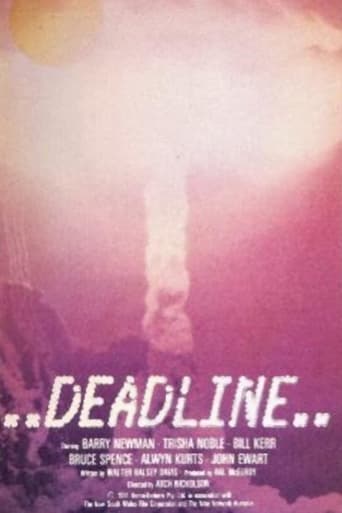Stephan Hammond
It is an exhilarating, distressing, funny and profound film, with one of the more memorable film scores in years,
rsoonsa
Those techniques that create feelings of suspense are not provided within this work made for Australian television, but a raised question is universally cogent - - if extortionists (not terrorists) utilize a nuclear bomb as blackmail tool to obtain funds from a government, what should be a governing agency's attitude regarding release of potential panic-inspiring information to the public at large? The film opens effectively, with peaceful footage of the western New South Wales Outback's fauna, soon distressed by an enormous explosion that produces a type of mushroom cloud. As Canberra authorities are puzzling over what might be an earthquake, a ransom demand for cash and narcotics is received by the National Security Adviser, proxy for the Prime Minister in this instance since there is no apparent military involvement with the threat. At this time, an American journalist, Barney Duncan (Barry Newman) determines that there was indeed a nuclear blast in the Outback and he, with an obligatory comely female companion, Gillian, played by Trisha Noble, discover that a second nuclear bomb has been planted in Sydney, with fewer than 48 hours before its programmed detonation. While Barney and Gillian, abetted by a computer knowledge comprehensive expert (Bruce Spence), desperately attempt to locate the device, they must additionally ward off constant interference from government agents who attempt to stop them from doing so, for reasons not made completely clear in the script. Casting is a weak point, with the uninspiring Newman filling a role for which an Australian actor would be a more suitable character, and the bland Noble merely takes up space; fortunately, there is no effort to write in an overt romantic liaison between them as chemistry is nil; even more fortunate, Bill Kerr is on hand as the flint-edged and rational National Security Adviser, handily dominating his scenes. The film's television lineage is apparent in its generic thematic scoring, and in the style of editing that points to commercial intermissions, but more damaging by far are over-sized flaws in the screenplay pertinent to logic and continuity that will be distracting to many viewers. Clichés drain the plot of impetus, as do hackneyed business, including a nonsensical car chase, while attempts to didacticize events by having Duncan bleat about a government's duty to permit journalistic freedom can not enliven a tired story and tiresome playing by the two principals.

